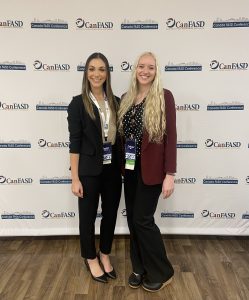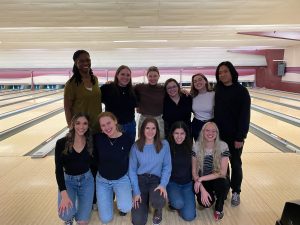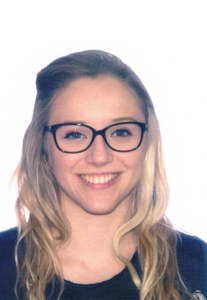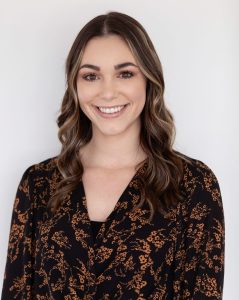Celisse Bibr and Taylor Watkins were recipients of the Student Travel Award for the Canada FASD Conference 2023. In this blogpost, they give their first-hand experiences of attending the conference and sharing their research.
Our Background
Hello everyone! Our names are Celisse and Taylor; we’re two Ontario friends who met in graduate school. Taylor is a recent graduate from the Master of Arts in Interdisciplinary Health program from Laurentian University, Ontario. Celisse also completed this program in 2018! Celisse joined the Master of Arts program under the supervision of Dr. Shelley Watson, who had a recent graduate from the PhD program you might recognize: Dr. Kelly Harding (CanFASD’s Director of Research Administration). Dr. Harding has been a mentor to Celisse throughout her time in the MA and PhD programs and a supervisor for Taylor in the Interdisciplinary Health program.

(Pictured: That’s Taylor on the left, and Celisse on the right.)
Dr. Watson and Dr. Harding brought us into the world of FASD when our knowledge was limited. Celisse first completed a research project around medical students’ knowledge of FASD in Northern Ontario. Currently, our research aims to explore the opinions of individuals of childbearing age and pregnant and postpartum individuals about the harmful and stigmatizing nature of existing FASD prevention campaigns. With the information gained from our research, we aspire to inform effective and non-stigmatizing FASD prevention approaches.
We had never actually been able to meet in person…until now, at the first Canada FASD Conference, over in Saskatoon!
Our time at the conference
The conference began on Tuesday, November 7th 2023. The opening ceremony in the large auditorium truly showcased how many people had come together for FASD. There were multiple sessions ongoing at the same time; something like five sessions per time slot. Most with three presentations or a workshop within the session.
We often compared experiences after we’d gone to our respective sessions, sharing some of the amazing presentations we saw. The emphasis on living experiences, inclusive atmosphere and emphasis on comfort and connection came together to create something wonderful.
Celisse’s Perspective
As a research assistant for CanFASD, I was asked to moderate two sessions. I also presented some of the research I’ve been working on for CanFASD’s housing project. I moderated a panel on “Re-inventing the Wheel – an Innovative Approach to FASD and Justice”, which was so well-received that I had to cut off our question period! We ran out of time in the best way, the discussion was just so wonderfully in depth.
My presentation, “’We need to do better’: barriers and opportunities for housing solutions for Canadians with FASD,” went very well, and I finished off my time at the conference by moderating again: this time, a session with three presentations, that ended on Dr. Lori Cox’s “Love, Marriage, and FASD – the heart has its reasons that the reasons don’t understand”. Ending the conference with a story about love really left us with the perfect feeling.
Taylor’s Perspective
The opportunity to attend the conference was a very surreal experience for me. As a recent graduate from Laurentian University, I was honoured to be presented with the opportunity to present my master’s research titled “Supporting Healthy Pregnancies: Informing Effective and Non-Stigmatizing Approaches in Northeastern Ontario”.
While I have attended virtual conferences in the past, it was exciting but also nerve wracking knowing that the conference was going to be held in-person. I was ecstatic that I would be able to share my research and interact with academics and scholars that I have looked up to throughout my academic journey. Also, as a research assistant with CanFASD, my time at the conference also involved facilitating discussions at the FASD prevention and the National FASD Strategy workshops.
Our evenings were busy as well; on Tuesday, all the alumni from the CanFASD trainee program were able to get together for a bowling night, and on Wednesday, there was a mocktail networking night that allowed everyone to mingle and talk the way we had been wanting to all week.

(Pictured: Alumni from the CanFASD 2022 and 2023 trainee program).
Favourite part of the conference
Our favourite thing about the conference was the feeling. It was warm, welcoming and inspiring. Many times, after a conference or a big event like this, you leave feeling drained, but Taylor and I were just excited. We even brainstormed more projects we could do together. It was such an energizing and re-invigorating conference, and in that, it’s unique. Neither of us had experienced a conference like that before.
We were so excited to meet people from outside of Canada, as well; we met individuals from Brazil, New Zealand, Australia, the United States—it was such a great way to expand our horizons, make connections, and learn about all the innovation in the world of FASD. In the world of research, it’s easy to get stuck in your own little bubble: this conference was a wonderful way for that bubble to burst.
What’s next?
Needless to say, we can’t wait to join the Canada FASD Conference in 2025—in Toronto, Ontario! It’ll be much less of a travel, but no less exciting. Taylor is going to continue her research on FASD prevention, and aspires to continue her education. Celisse will be continuing her research on FASD campaigns as part of her PhD, and her work as a research assistant with CanFASD’s housing project.
We’re both very excited to share where we’ll be in 2025. We can’t wait to see where the world of FASD takes us next! Thank you so much to CanFASD for giving us the opportunity to go to such a great conference. We’re grateful to have received our travel awards. We will do all we can to integrate everything we’ve learned in our research. If you’d like to talk to Taylor about her research, you can reach her at twatkins2@laurentian.ca, and you can reach Celisse at cbibr@laurentian.ca. We hope to see you in 2025!

Celisse Bibr is a M.A. graduate from Laurentian University’s Interdisciplinary Health program, and a current PhD candidate in the Rural and Northern Health program. She is also working with CanFASD as a research assistant on their CHOoSE project, which aims to improve housing outcomes for individuals with FASD.
 Taylor Watkins is an M.A. graduate from Laurentian University’s Interdisciplinary Health program. She currently works with the Maamwizing Indigenous Research Institute at Laurentian University as a research coordinator and with CanFASD as a research assistant.
Taylor Watkins is an M.A. graduate from Laurentian University’s Interdisciplinary Health program. She currently works with the Maamwizing Indigenous Research Institute at Laurentian University as a research coordinator and with CanFASD as a research assistant.
